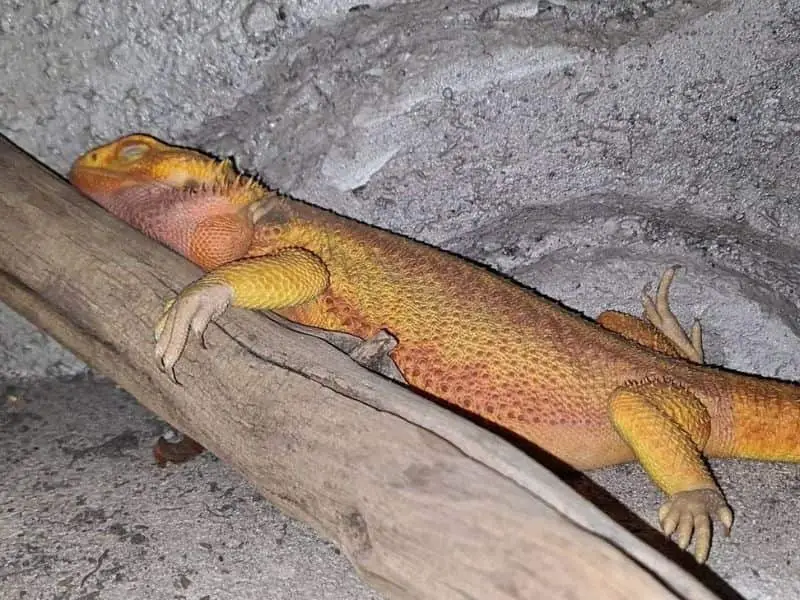What is your bearded dragon doing in the corner? Do the other animals around them spook them, or are you neglecting to provide adequate hiding places for your pet? Whatever their reasons, it’s important that you know how to recognize when a bearded dragon is stressed and what can be done about it.
A bearded dragon may sleep in the corner of its tank due to a lack of hiding spots, lethargy, brumation, parasites, or the presence of other pets that are causing the lizard stress. Set up the tank properly to provide enough shelter, heating mats, and hiding spots for the reptile to feel safe.
Why is my bearded dragon sleeping in a corner?

If you notice your bearded dragon sleeping in the corner of its enclosure consistently, something is not okay in its tank and you want to check and correct that. It is a major sign of discomfort and stress.
Here’s why your beardie sleeps in a corner:
Lack of hiding places
If you don’t provide your bearded dragon with ample hiding places, they will eventually start to feel uncomfortable and stressed. As a result, the bearded dragon will surf its glass enclosure and show signs of anxiety to try and find an exit and possibly go into hiding. In the end, most lizards will settle in a corner and make it their sleeping space.
As nocturnal animals, it is common for them to sleep during the day in dark corners of their enclosure or under plant leaves if no other option exists. Therefore, if you find your pet sleeping in one corner of its enclosure, it simply means that there aren’t hiding spaces or plants in the bearded dragon tank where they can find safety and sleep.
A lack of hiding spaces can cause stress, leading to unusual behavior such as sleeping in the corner of the enclosure.
Provide at least one hideout per cage size – preferably two! That way, when your pet wakes up from its daytime slumber, it can find cover quickly.
Lack of hiding spots leads to:
- Stress (stress generally doesn’t have any physical symptoms).
- Inability to rest/sleep well (because there’s no safe place to sleep)
The right thing to do is to provide hiding spots for your bearded dragon so they can sleep in the corner of their enclosure.
If you provide at least one, preferably two hides per cage size to provide ample cover for the beardie, it should find comfort and won’t need to sleep in its tank’s corners anymore.
Lethargy
Another reason why bearded dragons sleep in corners is lethargy. This can also happen for several reasons, such as stress or illness. You’ll notice lethargy in your beardie when there are other hiding places but the lizard still sleeps in the corner of the tank.
You still want to check for other signs of inactivity to determine whether that’s the actual reason for not sleeping in its hiding spaces in the enclosure.
If lethargy becomes chronic and persists without any noticeable cause (such as injury), the lizard may be ill and immediately need medical attention. Lethargic behavior can also lead to anorexia, which worsens its symptoms.
The lethargy should not last longer than 24-72 hours if it’s caused by externals like environmental changes or new animals introduced into their tank. However, lethargy that lasts more than one-week warrants concern because there could be an underlying problem with your beardie.
‘Lethargic behavior in bearded dragons is characterized by lazy movements and a flat body posture. Reptiles with lethargy will often not move much or even eat at all.
Brumation
During brumation, your pet will sleep much more than usual as their metabolic rate drops. It may even be difficult for you to wake them up from their slumber. Due to their increased inactivity, you might find your bearded dragon sleeping in the corner of its enclosure if that’s the only place they can hide safely in the tank.
The brumation cycle happens when the beardie’s metabolism slows down to regulate its body temperature. This is often seen during the winter or late fall, but it can also happen at other times of the year, depending on location and weather changes.
Brumating bearded dragons may stop eating food altogether and will spend much of their time sleeping during this period. As a result, they might only come out once every few days for a brief feeding session before returning to hiding again.
You must know how to recognize when your bearded dragon is undergoing brumation. Some of the signs include:
- Lack of interest in anything
- Hiding almost all the time
- Sleeping almost all the time
- Not eating
If your bearded dragon is sleeping and hiding in a corner all the time during its brumation period, provide enough hiding spaces so that it won’t have to sleep in its tank’s corners for safety.
Cold (low temperatures)
Bearded dragons are cold-blooded reptiles that need warmth to stay healthy. If extreme temperatures (very high or low) occur, your pet may decide to sleep in the corner of its cage, especially if that is the only spot in the enclosure that feels a little warmer.
During extreme weather changes like extremely hot or cold, you must provide enough hiding spaces that are warm and cold so the beardie can find cover when they want to take a break from being out in the open during these extremes without risking harm.
The bearded dragon will experience increased stress levels if it doesn’t have any places where it feels safe from environmental factors such as temperature fluctuations, which leads them to search for refuge corners throughout their enclosure until it’s safe again.
Suppose extreme temperatures continue for an extended period. In that case, your bearded dragon may not be able to regulate its body temperature at all and it will eventually lead to death if you don’t act quickly enough.
Parasites
A bearded dragon that hides and sleeps in the corner all the time is in distress. One major cause of stress is parasites, which cause discomfort when they infect the beardie’s body.
If parasites are detected, removing them as soon as possible is important because they can be fatal if left untreated for too long. In addition, bearded dragons with parasites will often lose interest in food and start showing signs of restlessness, aggression, and other abnormal behaviors.
Be sure you examine your bearded dragon during each health check carefully, so you don’t miss parasites when they’re easily detectable.
Presence of other pets
If your tank has other pets in it, they may be causing the beardie to feel stressed and sleep in the corner of its enclosure instead of using its hide.
Bearded dragons are solitary creatures and tankmates can cause stress because of territorial disputes or anxiety caused by being around unfamiliar animals that could attack them at any moment.
A tank with too many animals – will lead to overcrowding which will bring several problems for all inhabitants including aggression among tank mates and also an increase in parasites since there are more opportunities for one animal to come into contact with faeces from another pet.
It is important not only during brumation but always to provide enough hiding spaces so that bearded dragons won’t have to sleep in the corner of the tank when they want peace away from tankmates.
Poor lighting conditions
Another reason your bearded dragon may prefer to sleep in the corner or isolated parts of the tank is poor lighting conditions. This can be too much light that leaves the beardie exposed even when sleeping in its hiding places.
The corner of the enclosure could be the tank’s only place with better lighting for the bearded dragon to sleep without being disturbed.
We recommend that you pick a spot near the entrance of your beardie’s enclosure to install another light source so they can get better lighting.
If poor lighting persists, it will cause stress and lead to other health problems including eye damage or blindness. Bearded dragons require UV rays for metabolizing calcium, which helps them regulate their appetite and produce vitamin D to stay healthy.
Poor lighting conditions mean these requirements are not being met properly and uncontrolled shedding could occur since there is no way for the bearded dragon to balance its body functions with improper exposure.
It is also important when choosing lights for your tank that you choose lights specifically designed for reptiles. For example, a bearded dragon needs a full-spectrum light for 12-14 hours each day during the spring and summer months, or about 8 hours for fall and winter. UV rays cannot pass through glass or plastic, so place the light directly above your bearded dragon and avoid any material between it and the bulb.
Is your bearded dragon new to its tank?
The new bearded dragon may be acclimatizing to its new tank. And sleeping in the corner while doing so is a good way to feel more secure as this natural behaviour will help them relax and adjust. You should try your best not to let their tanks get too hot or cold for new beardies. Try and help them to adjust to their new environment fully.
Sleeping in the corner of the tank may be normal as the new reptile may not have discovered the tank enough to choose its sleeping and hiding spots. As such, this behavior should not worry you, but if it remains persistent, you might want to investigate further to ensure nothing else is bothering the beardie to make them sleep in the corner of its enclosure.

